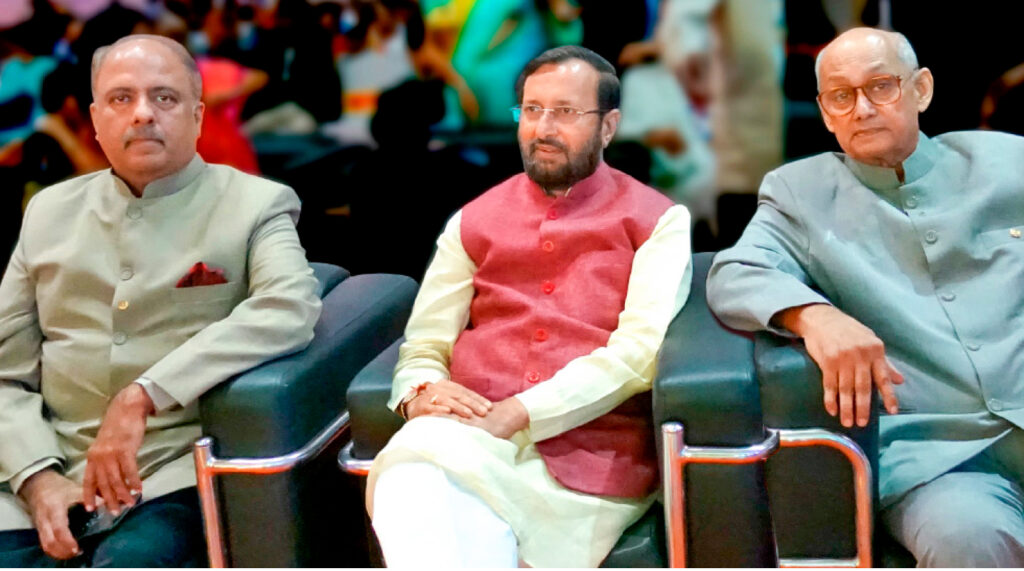In a Zoom meeting convened by RIPN Shekhar Mehta with Prakash Javadekar, Minister of Environment, Forest and Climate Change, and Information and Broadcasting, over 300 Rotarians discussed issues ranging from literacy, environment and the COVID pandemic.

Mehta requested Javadekar to organise a five-minute virtual meeting with PM Modi. “We have surpassed our target of ₹25 crore for the PM CARES Fund for COVID-19 relief. Rotarians have contributed ₹30 crore so far; and it will enthuse us more if we can symbolically hand over the cheque to him over a Zoom meet,” he said.
He spoke about Rotary India’s environment mission in which “30 crore saplings will be planted in the next five years and one lakh solar lamps installed in many villages.” He apprised the Minister of Rotary’s response to the pandemic. Rotary clubs have distributed over one crore masks, 75,000 PPEs, two lakh litres of sanitisers, over 25 lakh meals, ₹20 crore worth medical equipment and women trained at Rotary’s vocational centres are stitching masks for various regions. “The total value of our work is ₹75 crore and still counting.”
He reiterated that Rotary will implement 10 per cent of government’s projects in the next five years and ₹200 crore worth humanitarian projects in the country to commemorate Rotary India’s centennial.
In a lighter vein, he pointed out how the government has taken care of the entertainment quotient of people during the lockdown. “The telecast of Ramayan and Mahabharat is a great move. My mother watches these serials for at least five hours every day,” said Mehta.
New normal
Javadekar in his address pointed out that video conferencing, masks, sanitisers and frequent hand washing are the new normal. “This is how we have to meet in the coming days until a vaccine is discovered to protect people against the corona virus”. In his 40-year association with Rotary, he had participated in Rotaract programmes during his college days, he said.
Adult literacy is close to his heart, the Minister said. “My mother was a primary school teacher and during an adult literacy campaign in a village, accompanying her when I was 10, I remember telling her that I will teach the older men while she teaches the women. And I enjoyed doing that.” He praised RILM’s syllabus designed for Adult Literacy, and said he had recommended it to the NCERT board.
I see a new India emerging where our people return to their roots and participate in our development.
The Minister gave an account of India’s progress in managing the corona pandemic. “The Make in India concept is more pronounced now. We are making our own masks and PPEs. We have started implementing in three months what we could not do in 70 years. We are exporting hydroxychloroquine, the COVID-fighting drug to the world. I see a new India emerging where our people return to their roots and participate in our development. This pandemic has taught us several lessons and given us opportunities to grow,” he said.
A Q&A session was moderated by RI Director Bharat Pandya.
PRIP Rajendra Saboo asked the Minister how the government was planning to keep the country clean after the lockdown is lifted, especially “when I see rivers like the Ganga flowing so clean”.
In a lighter vein, Javadekar urged Saboo not to “become over-romantic. During the lockdown, work has come to a standstill everywhere. But it cannot remain so for long. You want to live in a big town, have more facilities, factories etc. But you don’t want pollution. You cannot have the cake and eat it too. We can only minimise pollution and not fully stop it.”
PRIP Kalyan Banerjee suggested that behavioural change towards environment be introduced as a subject in schools and colleges. Javadekar welcomed the idea and suggested launching a smart campus campaign and recognising colleges excelling in areas such as cleanliness, greenery, electricity saving/generating, water treatment and waste management.
Air and water pollution and tackling climate change are this government’s primary focus areas, Javadekar said, replying to a poser from PDG Kamlesh Raheja, Rotary’s Environment Committee Co-chair.
Director Pandya asked why the ban on single use plastics is not as effective as it should be.
The Minister replied that banning of plastics is not the solution. A system should be in place to collect and recycle plastic waste. Cement and other industries are using multi-layer plastics. Thermocol and single use plastics such as sachets, straws and cups should be banned; it is not easy to collect this waste. They cause harm to the environment.
To another question on whether the government can earmark some barren lands across the country for Rotary to create mini-forests, he said that a National Forest Policy is being planned for a private-public partnership. Presently, India is importing ₹40,000 crore worth wood, and Indian industrialists own forests abroad. “The concept is not attractive here because cutting trees is banned. The new policy will address this drawback,” said Javadekar.
In his welcome address, RI Director Kamal Sanghvi said, “You have been a guiding force when we launched our literacy programme and we want you to be with us now as we focus on environmental programmes.”
RIDN Ravi Vadlamani delivered the vote of thanks.






